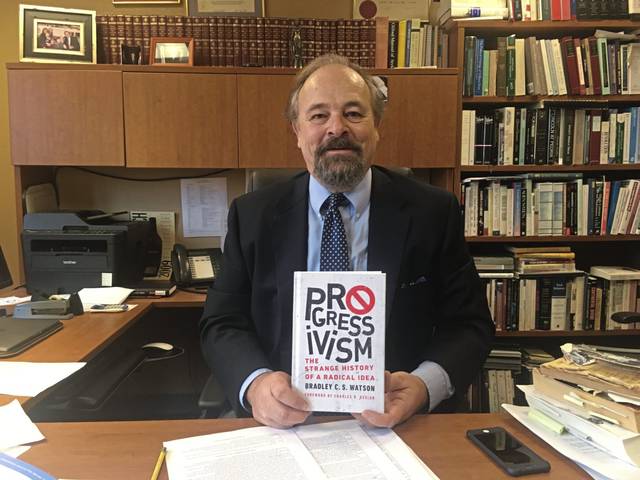The demise of Democratic presidential hopefuls Bernie Sanders and Elizabeth Warren does not mean the end of progressivism in the political spectrum, said a Saint Vincent College professor who has written a new book analyzing the movement in the United States.
“Even though both (U.S. Senators) Warren and Sanders have withdrawn from the Democratic race, their candidacies show that progressivism is still very much on the march. They have had the effect of pulling the Democratic Party — including its presumptive nominee, Joe Biden — even further to the left,” said Bradley C.S. Watson, a political science professor and chairman of the politics department at the Unity school.
“Some progressives are in a hurry and will be disappointed or angry about the nomination of a seemingly ‘mainstream’ candidate like Biden. But the more thoughtful ones are willing to bide their time, realizing that they are playing the long game — which means slowly, surely, and inevitably, or so they think, shifting America off its constitutional foundations,” said Watson, author of “Progressivism: The Strange History of a Radical Idea.”
Watson sees progressivism as an ideology that is not compatible with American constitutional ideas.
“Progressive thinkers always have been hostile to the American Constitution,” Watson said.
Rather than seeing the document written by the founders more than two centuries ago as a “fixed Constitution,” progressives consider it “the living Constitution,” where new rights “can be constantly invented” and poured into the “empty vessel” of the living Constitution.
As a prime example, he pointed to the landmark 1973 U.S. Supreme Court decision of Roe v. Wade, in which the court ruled that the Constitution protects a woman’s right to choose whether to have an abortion without excessive government restriction.
“If the ‘living Constitution’ wins, the founders’ Constitution dies,” said Watson, who also is a director of the college’s Center for Political and Economic Thought.
His book explores how progressivism was transmitted from Europe and “domesticated” in the 20th century to make it seem less threatening to the Constitution than it is. Watson presents an intellectual history of American progressivism as a philosophical-political phenomenon, focusing on how and with what consequences the academic discipline of history came to accept and propagate it.
Watson, who also wrote “Living Constitution, Dying Faith: Progressivism and the New Science of Jurisprudence,” said progressives wanted to create an image of a “warm and fuzzy movement” because they were in deep sympathy with the view that the “Founder’s Constitution gets in the way” of their goals for governing. The book critiques academics who support and promote progressivism.
In contrast to a political philosophy of limited government powers, progressives saw the need for revolutionary change that would expand the public sphere on a national level. They want to shift away from self-government and relentlessly “expand government power,” Watson said.
When either political party is in power, it tends to adopt that progressives’ view of expanding power. That flies in the face of the nation’s founders who sought to limit government’s power and not make the president “the focus of everything,” Watson said.
Republicans often have no objection to expanding government’s power when they are in control, but they do so opportunistically, Watson said. “Democrats actually believe in it.”








